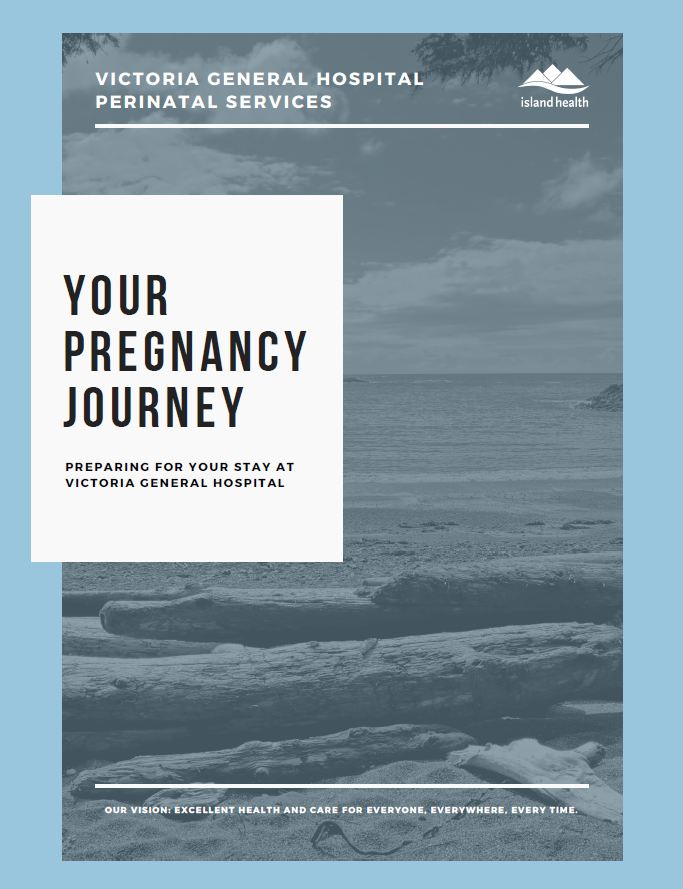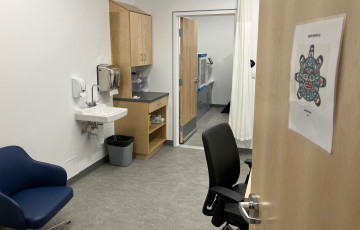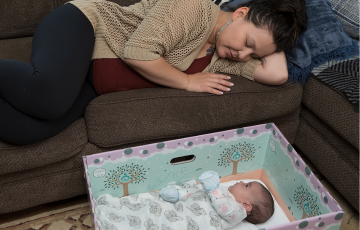If you may be pregnant and are considering your options, you can find more information on the Unexpected Pregnancy page.
Register for Prenatal Information Right Away!
Register with the Right From The Start program early in your pregnancy.
A healthy baby begins before birth with a healthy person:
- Early prenatal care and information promotes good health for both you and your baby.
- A nutritious diet, including folic acid supplements, is essential for you and your child to maintain healthy development.
- To keep your baby safe, avoid alcohol, drugs, and cigarettes.
- Ensure you have a good balance of rest and activity.
- Your emotional well-being is important to a healthy and safe pregnancy.
SmartParent
SmartParent is a free prenatal and parenting support program that will send you text messages with trustworthy information timed for your pregnancy and baby’s first year of life.
The content of the program is current, evidence-based, and has been developed by maternal and child health experts. The program provides suggested topics to discuss with your health care provider and recommendations for resources available both online and in your community.
SmartParent is endorsed by the Society of Obstetricians and Gynaecologists of Canada (SOGC) and the Canadian Paediatric Society (CPS).
Who Provides Pregnancy Care?
In British Columbia, family doctors or midwives provide prenatal health care. Both types of care are covered under the Medical Services Plan. If your family doctor does not provide maternity care, he or she will refer you to a doctor accepting maternity patients.
If you need specialized care during your pregnancy, your maternity doctor will refer you to an OB/GYN (obstetrics and gynecology) doctor.
Visit these links for more information:
- Doctors and Midwives
-
By making regular visits to a doctor or midwife you ensure you and your baby are as healthy as possible and any dangers or complications are discovered as early as possible.
Under B.C.’s Medical Services Plan, you can choose either a doctor or a registered midwife to be your primary prenatal caregiver. A Midwife is a trained professional who provides comprehensive care and support during pregnancy, labour, birth and the six week postpartum period to healthy women and their newborns. Family doctors deliver comprehensive medical and maternity care. If your family doctor no longer practices obstetrics, he/she will refer you to a doctor who will take care of you during your pregnancy and post-partum period. If you know you are at high risk in your pregnancy, you should see your doctor who will also involve a specialist Obstetrician in your care.
- Choosing a Doctor or Midwife - Things to Consider
-
- What are your beliefs about childbirth?
- Do you have experience working with women who are similar to me?
- A good prenatal care provider is familiar with the particular characteristics
- and situations (family, age, religious, medical history, etc.) that may affect your pregnancy.
- What are your office hours?
- What is your vacation schedule?
- What is your on-call coverage?
- Do you work with other doctors or midwives who may be part of my care?
- How many babies do you deliver in a year?
- General guideline for prenatal checkups
-
Once you have confirmed your pregnancy, your doctor or midwife will let you know when to schedule appointments for your prenatal care.
- week 12-13 (or after you have missed your second period – first prenatal check-up)
- month 2-7 of pregnancy – once a month
- month 8 of pregnancy – once every 2 weeks
- month 9 of pregnancy – once a week
- What to expect at your prenatal appointments
-
Prenatal visits to a doctor or a midwife should be scheduled about once per month in the first and second trimesters and more often in the third. It may be helpful to have a partner or birth support person with you at prenatal care visits since they are part of your prenatal care and birth support team.
If you are new to your midwife or maternity doctor, you will be asked for a complete medical history at your first visit.
At each visit, you will give a urine sample, have your blood pressure taken, and be weighed and measured. Your care provider will also allow you to listen to the baby’s heartbeat when it becomes loud enough to hear.
At each visit, you will have an opportunity to ask questions and talk to your care provider about any concerns you have. You may want to write your questions down before your visits.
Depending on your medical history and current health, your doctor or midwife may request a variety of tests. These can include blood type, RhoGAM, glucose, HIV, hepatitis B, some sexually transmitted diseases, and Group B Streptococcus testing. An amniocentesis may be conducted to detect birth defects. Non-stress tests and fetal movement counting help monitor the health of your baby.
Prenatal care involves planning for the birth. Discuss your options, plans, and wishes with your care provider.
- Ultrasounds
-
Ultrasounds are commonly performed once or twice throughout the course of a pregnancy. What is an ultrasound and when it is done? For answers to frequently asked questions, read our Ultrasound Fact Sheet
The Birth
Every birth is guided by choices but governed by circumstances. This section contains planning information and resources to help you prepare for labour, birth, and welcoming your baby into the world.
- Giving birth is a natural, healthy process.
- Before you reach labour, make time to discuss your wishes and plans for your birth experience with your doctor or midwife.
- The members of your birth team - a doctor and/or a midwife, a labour nurse, and your support people (partner, husband, mother, friend) - will each play different but important roles in your birth experience.
- Plan to visit your hospital so you can become familiar with the location, layout, procedures, and staffing.
- Ensure you have plenty of help and support during your first days with your child. Give yourself time to regain your strength and bond with your baby.
- Preparing for your stay at Victoria General Hospital (VGH)

- The Birth Team
-
The members of the birth team and their roles are similar for each mother and each birth. The following is a general guide to the people who may assist with your home or hospital birth.
- Parent and Baby
-
You and your baby are the most important members of the birth team.
- Birth Support Person
-
A birth support person provides emotional support and helps with relaxation techniques and comfort measures. Some parents wish to have more than one birth support person. Hospitals may have a limit on the number of personal support people that can attend your labour and delivery.
- Doula
-
A doula is a trained labour support person hired by some people to share experiences and knowledge before, during, and after the birth. Doulas charge a fee (not covered by MSP).
- Labour Nurse / Registered Nurse
-
Your labour nurse is assigned to you when you are admitted to the hospital. She or he will provide care throughout your labour by assessing your stage of labour, monitoring your progress, checking your vital signs, and monitoring the baby’s heart. Your labour nurse also assesses your pain and provides comfort measures, which may include position changes, warm blankets, massage, and verbal/emotional support and coaching. The nurse works with your midwife and doctor, and maintains frequent contact, to provide care during your delivery. Depending on hospitals shifts, your labour nurse may change.
- Midwife
-
You will likely call your midwife at the first signs of labour. Generally, your midwife will meet you as soon as necessary at home or at the hospital. Your midwife works with you to manage your labour. She will assess your stage of labour, monitor your progress, check your vital signs, and monitor the baby’s heart. She will also assess your pain and provide comfort measures and verbal/emotional support and coaching. Providing your labour progresses well, your midwife will deliver your baby. At any sign of complication, your midwife will move you to a hospital, if you are not already there. There she will work with a physician or specialist, as your birth requires.
- Doctor
-
You should notify your doctor when your labour has progressed far enough that you are heading to the hospital. When the doctor arrives in the labour and delivery unit depends on the individual, the progress of your labour, and any other circumstances. Once at the hospital, the doctor will assess your progress and be available if any difficulties arise. You may be seen by resident physicians at the hospital, in additional to your maternity doctor. Your labour nurse will be in frequent contact with your doctor and, when necessary, will ask your doctor to return to the delivery room. Your doctor will consult a specialist to assist with your birth when necessary.
- Specialists
-
At various times during labour and delivery, you may see an obstetrician, an anaesthesiologist, and/or a pediatrician. Your doctor or midwife may consult with an obstetrician about your care if any difficulties arise. If you require a caesarean birth, an obstetrician and a doctor will perform the delivery. An anesthesiologist will administer an epidural, if required for pain relief in labour or for anesthetic for a caesarean. Your doctor or midwife may consult with a pediatrician if your baby needs special care.
Birth Planning
The best approach to birth planning is to discuss your hopes, wishes, and plans cooperatively with your doctor or midwife. A formal, written birth plan is not necessary but it can be a useful way to communicate your plan with your labour nurse or another doctor/midwife if your care giver is not on call.
A birth plan includes deciding where you would like to deliver your baby, at home or in your local hospital. It can include the types of comfort measures you want available (massage, warm baths, etc.) and the options you prefer for pain relief.
- Things to think about:
-
- Who do I want to be part of my personal support team during labour and delivery, and in the first days after?
- What do I hope my birth experience will be like?
- How will I prepare myself for the unexpected during labour and delivery?
- What do I need to bring to the hospital?
- Depending on the time of day, how will I get to the hospital?
- Will my other children come to the hospital?
- Who will care for them at home or at the hospital?
- Have I purchased enough baby supplies, including a certified car seat, ahead of time?
- Do I plan to breastfeed my baby?
- Questions to ask your midwife or doctor:
-
- What will the atmosphere and environment be like during my labour and delivery?
- Who will make up my delivery team?
- Under what circumstances might I require: induced labour, fetal monitoring, caesarean section, episiotomy, or other medical assistance?
- What are my comfort measures and pain relief options?
- How many support people (family, friends) may be present at the birth? Can my other children stay with me during delivery?
Vancouver Island Birth Hospitals
- Visiting Hours
-
We believe people heal best when surrounded by family and friends. As such, we welcome visitors and do not impose limited visiting hours at our hospitals. In certain situations, care staff may regulate the number of visitors and length of visits based on patient needs and/or requirements of the unit. Read our visitor guidelines.
- Our Birth Hospitals
-
Cowichan District Hospital
Lady Minto Hospital - Saltspring Island
Nanaimo Regional General Hospital
Port McNeill Hospital
A pre-admission package is available from the Central Vancouver Island Health Unit, or the admitting department of the hospital. Pre-registration helps the hospital process your admission and address your accommodation preference.
North Island Hospital, Campbell River & District
North Island Hospital, Comox Valley
Victoria General Hospital (VGH)
Preregistration for your birth can be done any time prior to admission.
West Coast General Hospital
Labour & Birth
You are ready. You have a plan for your labour and birth. The following is a short guide to a “typical” labour and birth.
Labour is divided into three stages.
- First stage - latent and active
-
- Your cervix thins and stretches during the latent first stage and during active first stage the cervix dilates 10 cm.
- In the latent stage you may feel a backache and your membranes may rupture (water breaks). During this phase eat some small nutritious snacks, drink water, and rest.
- In the active stage, you will experience your first contractions. You may feel nauseated. Try to stay hydrated by drinking plenty of fluids.
- The first stage of labour normally lasts anywhere from 2 to 12 hours.
- Second stage
-
- While the cervix finishes dilating from 8 to 10 cm, you are in transition from the first to the second stage of labour.
- At the second stage of labour, the baby’s head will begin to show.
- You will now begin pushing.
- The second stage of labour ends with the delivery of the baby.
- Third stage
-
- Labour and contractions continue with the third stage.
- During the third stage, the body works to expel the placenta. Usually within 20 minutes of the birth, you will work to push the placenta out.
- Come to the hospital when…
-
- You experience regular, moderately uncomfortable contractions lasting about 45 to 60 seconds and occurring at approximately three-minute to five-minute intervals;
- You have bright red bleeding, other than normal “blood show,” with or without contractions; or
- Your “water breaks” (amniotic sac ruptures), with or without contractions and your doctor or midwife has advised you by telephone to come to the hospital.
If you think you are in labour, call your doctor or midwife. If you cannot reach your doctor or midwife, call the labour and delivery unit of your hospital.
(Source: Having Your Baby at Victoria General Hospital pamphlet.)



